| Listing 1 - 10 of 21 | << page >> |
Sort by
|
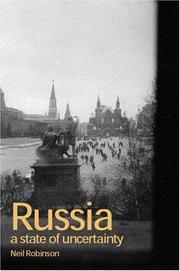
ISBN: 0415271126 0415271134 Year: 2002 Publisher: London Routledge
Abstract | Keywords | Export | Availability | Bookmark
 Loading...
Loading...Choose an application
- Reference Manager
- EndNote
- RefWorks (Direct export to RefWorks)
Internal politics --- Russian Federation --- Russia (Federation) --- Soviet Union --- Russie --- URSS --- Economic conditions --- Politics and government --- Politics and government. --- Conditions économiques --- Politique et gouvernement --- Russia --- Conditions économiques
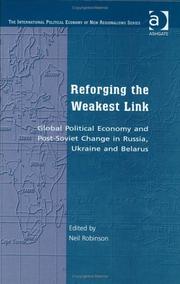
ISBN: 0754634949 Year: 2004 Publisher: Aldershot ; Burlington, VT : Ashgate,
Abstract | Keywords | Export | Availability | Bookmark
 Loading...
Loading...Choose an application
- Reference Manager
- EndNote
- RefWorks (Direct export to RefWorks)
Post-communism --- Postcommunisme --- Former Soviet republics --- Ex-URSS --- Commercial policy --- Economic policy. --- Foreign economic relations. --- Politique commerciale --- Politique économique --- Relations économiques extérieures --- Commercial policy. --- Politique économique --- Relations économiques extérieures
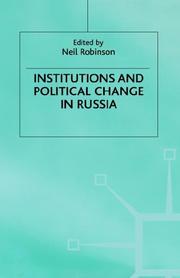
ISBN: 0333735250 Year: 2000 Publisher: Houndmills : Macmillan,
Abstract | Keywords | Export | Availability | Bookmark
 Loading...
Loading...Choose an application
- Reference Manager
- EndNote
- RefWorks (Direct export to RefWorks)
Political culture --- -Institution building --- #SBIB:328H262 --- #SBIB:35H6020 --- #SBIB:324H40 --- Social change --- Social institutions --- Social policy --- Culture --- Political science --- Instellingen en beleid: Rusland en het GOS --- Bestuur en beleid: nationale en regionale studies: Oost-Europa --- Politieke structuren: algemeen --- Russia (Federation) --- -Politics and government --- -Institution building. --- Institution building. --- Institution building --- Politics and government
Book
ISBN: 1282133969 9786613806543 1442210761 1442210753 1442210745 9781442210769 9781442210745 9781442210752 Year: 2012 Publisher: Lanham Rowman & Littlefield Publishers, Inc.
Abstract | Keywords | Export | Availability | Bookmark
 Loading...
Loading...Choose an application
- Reference Manager
- EndNote
- RefWorks (Direct export to RefWorks)
This timely book explores Russia's political development since the collapse of the USSR and how inextricably it has been bound up with economic change. Assessing the legacies of the Soviet period, leading scholars trace the evolution of Russia's political economy and how it may develop as bitter battles continue to be waged over property and state revenues, the development of private agriculture, and welfare. This book puts these domestic issues in international and comparative perspective by considering Russia's position in the global economy and its growing role as a major
Economics --- Economic development --- Political aspects --- Russia (Federation) --- Economic policy --- Politics and government --- Economic aspects. --- Development, Economic --- Economic growth --- Growth, Economic --- Economic theory --- Political economy --- Russian Federation --- Rossiyskaya Federatsiya --- Rossiya (Federation) --- Rossii︠a︡ (Federation) --- Российская Федерация --- Rossiĭskai︠a︡ Federat︠s︡ii︠a︡ --- Російська Федерація --- Rosiĭsʹka Federat︠s︡ii︠a︡ --- Federazione della Russia --- Russische Föderation --- RF --- Federation of Russia --- Urysye Federat︠s︡ie --- Правительство России --- Pravitelʹstvo Rossii --- Правительство Российской Федерации --- Pravitelʹstvo Rossiĭskoĭ Federat︠s︡ii --- Правительство РФ --- Pravitelʹstvo RF --- Rosja (Federation) --- O-lo-ssu (Federation) --- Roshia Renpō --- Federazione russa --- OKhU --- Orosyn Kholboony Uls --- Statics and dynamics (Social sciences) --- Development economics --- Resource curse --- Social sciences --- Economic man --- Russian S.F.S.R. --- Eluosi (Federation) --- 俄罗斯 (Federation) --- RF (Russian Federation) --- Россия (Federation)
Book
ISBN: 9780745631370 Year: 2018 Publisher: Cambridge, UK : Polity Press,
Abstract | Keywords | Export | Availability | Bookmark
 Loading...
Loading...Choose an application
- Reference Manager
- EndNote
- RefWorks (Direct export to RefWorks)
Vladimir Putin's return to the Kremlin for a fourth presidential term in 2018 has seen Russian democracy weaken further and Russia's relations with the West deteriorate seriously. Yet, within Russia, Putin's position remains unchallenged and his foreign policy battles have received widespread public support. But is Putin as safe as his approval ratings lead us to believe ? And how secure is the regime that he heads ? The author places contemporary Russian politics in historical perspective to argue that Putin's regime has not overcome the problems that underpinned the momentous changes in twentieth-century Russian history when the country veered from tsarism to Soviet rule to post-communist chaos. The first part of the book, outlining why crises have been perennial problems for Russia, is followed by an exploration of contemporary Russian political institutions and policy to show how Putin has stabilized Russian politics. But, while Putin's achievements as a politician have been considerable in strengthening his personal position, they have not dealt successfully with the enduring problem of the Russian state's functionality. Like other Russian rulers, Putin has been much better at establishing a political system that supports his rule than he has at building up a state that can deliver material wealth and protection to the Russian people. As a result, Russia has been and remains vulnerable to political crisis and regime change.
Book
ISBN: 9780745631363 9780745631370 0745631371 0745631363 Year: 2018 Publisher: Cambridge (UK): Polity press,
Abstract | Keywords | Export | Availability | Bookmark
 Loading...
Loading...Choose an application
- Reference Manager
- EndNote
- RefWorks (Direct export to RefWorks)
"In this innovative new book, Neil Robinson places contemporary Russian politics in historical perspective to argue that Putin's regime has not overcome the problems that underpinned the momentous changes in twentieth-century Russian history when Russia veered from Tsarism to Soviet rule to post-communist chaos"--
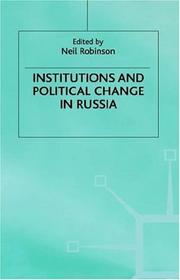
ISBN: 0312229259 Year: 2000 Publisher: New York : St. Martin's Press,
Abstract | Keywords | Export | Availability | Bookmark
 Loading...
Loading...Choose an application
- Reference Manager
- EndNote
- RefWorks (Direct export to RefWorks)
Political culture --- Institution building. --- Culture politique --- Institutions sociales --- Etablissement --- Russia (Federation) --- Russie --- Politics and government --- Politique et gouvernement
Book
ISBN: 1858981670 Year: 1995 Publisher: Aldershot Elgar
Abstract | Keywords | Export | Availability | Bookmark
 Loading...
Loading...Choose an application
- Reference Manager
- EndNote
- RefWorks (Direct export to RefWorks)
Communism --- Ideology --- History --- Soviet Union --- Politics and government
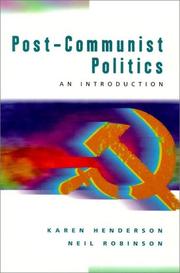
ISBN: 013442039X Year: 1997 Publisher: London ; New York : Prentice Hall,
Abstract | Keywords | Export | Availability | Bookmark
 Loading...
Loading...Choose an application
- Reference Manager
- EndNote
- RefWorks (Direct export to RefWorks)
Post-communism --- Postcommunisme --- Europe, Eastern --- Former Soviet republics --- Russia (Federation) --- Europe de l'Est --- Ex-URSS --- Russie --- Politics and government --- Politique et gouvernement --- Elections
Book
ISBN: 9781412919760 1412919762 Year: 2009 Publisher: Thousand Oaks (Calif.): Sage,
Abstract | Keywords | Export | Availability | Bookmark
 Loading...
Loading...Choose an application
- Reference Manager
- EndNote
- RefWorks (Direct export to RefWorks)
'Editors Landman and Robinson have compiled an excellent tour d'horizon of comparative politics. Distinguished contributors explore theoretical and methodological issues as well as examine the critical substantive domains that animate today's comparativists. Graduate students and academics will want to keep this volume on their book shelf' - Professor Mark Irving Lichbach, University of Maryland. '"The SAGE Handbook of Comparative Politics" is a major new resource for scholars of comparative politics, and of political science more generally. The Handbook covers the field with admirable thoroughness, but does not sacrifice depth for breadth. The chapters are written by notable scholars who provide rich discussions of their topics, and help to move the sub-discipline forward' - B. Guy Peters, Professor, University of Pittsburgh. "The SAGE Handbook of Comparative Politics" presents; in one volume, an authoritative overview of the theoretical, methodological and substantive elements of comparative political science.The 28 specially commissioned chapters, written by renowned comparative scholars, guide the reader through the central issues and debates, presenting a state-of-the-art guide to the past, present and possible futures of the field. The Handbook is divided into three parts. The first considers comparative methodologies and reviews the interactions between various sub-fields of comparative politics: political economy; political sociology; area studies; international relations; and institutional analysis. The second section examines nine 'classic' issues of concern to comparativists, including government formation, political behaviour and democratization. In the final section, nine new and emerging areas of comparative research are considered, such as terrorism, electoral corruption, human rights and regional integration. "The SAGE Handbook of Comparative Politics" is an essential resource for researchers in political science, political sociology, political economy, international relations, area studies and all other fields with a comparative political dimension.
| Listing 1 - 10 of 21 | << page >> |
Sort by
|

 Search
Search Feedback
Feedback About UniCat
About UniCat  Help
Help News
News